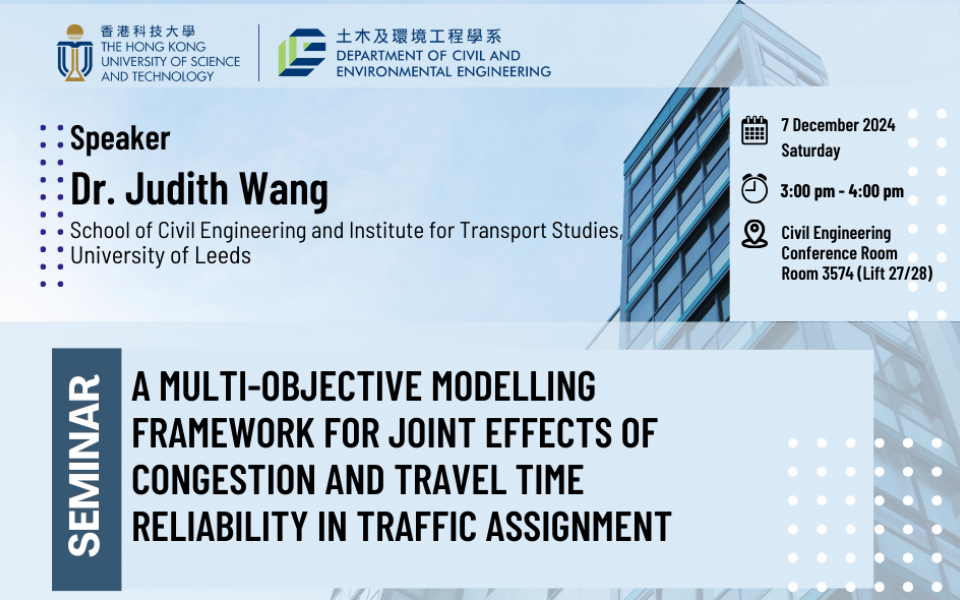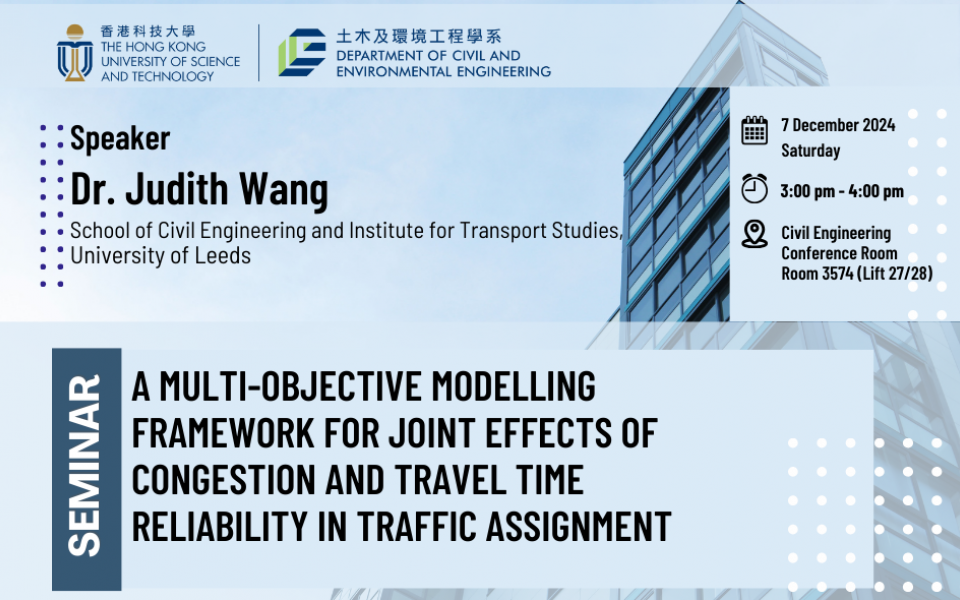Civil Engineering Departmental Seminar - A Multi-objective Modelling Framework for Joint Effects of Congestion and Travel Time Reliability in Traffic Assignment
Supporting the below United Nations Sustainable Development Goals:支持以下聯合國可持續發展目標:支持以下联合国可持续发展目标:
A Multi-objective Modelling Framework for Joint Effects of Congestion and Travel Time Reliability in Traffic Assignment
National Highways, U.K. has commissioned the University of Leeds to conduct a scoping study to develop a modelling and analysis framework to model joint effects of congestion and travel time reliability in traffic assignment. Wang and Ehrgott (2013)’s Time Surplus maximisation Bi-objective User Equilibrium (TSmaxBUE) model has been identified as a suitable modelling framework for further development. Travel time variability is introduced by assuming that each traveller will have a perceived travel time distribution for each route. Their expectations can be characterised by the expected average travel time and an expected maximum travel time. Based on these two expectations, a user will make his/her judgement on what might be the maximum travel time budget they are willing to allocate for each path. Travel Time Budget Surplus (TBS) is introduced as a measure of the level of satisfaction from the outcomes of a route choice decision. For each route, given the associated monetary cost, each user would have a maximum travel time budget (TTBmax) in mind. This forms an indifference curve of the maximum travel time budget. A positive TBS means the user will arrive within his/her TTBmax. In contrast, a negative TBS means that the actual travel time is longer than TTBmax. The expected lateness is effectively the expected value of negative TBS, while the expected value of positive TBS is a measure of the expected delay. A new concept of time loss in congestion is introduced. A user would always have a desirable level of service related to the driving conditions, which can be converted to a minimum travel time in mind for each route. Any time spent in excess of this minimum travel time is considered as time loss in congestion. In this way, all three elements that travellers care about, i.e. expected delay, unexpected delay and time loss in congestion, can all be mapped out clearly in the time dimension of this new modelling space.
Dr Judith Wang joined the University of Leeds in 2013 as Associate Professor in Transport Engineering in a joint appointment with the School of Civil Engineering (SoC) and Institute for Transport Studies (ITS). She received her MSc(Eng) in Transport Planning and Engineering from ITS in 1993 and PhD from Hong Kong University of Science and Technology in 2004. Dr Wang has over 25 years of international experience in transport planning, with substantial experience not only in academia but also in the transport industry. She has teaching and research experience in five different countries. Prior to moving to the UK, she worked in Hong Kong, New Zealand and France. Her key industry work experience in Hong Kong include operations planning of the Mass Transit Railway in Hong Kong and strategic planning for the new Hong Kong International Airport opened in 1998. In New Zealand, she had worked for the University of Auckland for more than eight years, as a Lecturer in the Department of Civil Engineering, a Research Fellow in the Energy Centre and a Senior Research Fellow in the Department of Engineering Science. In 2007, she visited Ecole des Mines de Nantes as a Visiting Lecturer for five months and in 2018, she visited Tokyo Institute of Technology in Japan for two months with an Invitational Fellowship, where she has taught at postgraduate level in both institutes.

